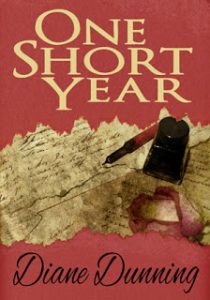
Most of the stories in One Short Year read more like writing exercises than actual stories. If you demand that your fiction have a clear beginning, middle, and end, then most of the stories in this collection will probably not suit you. However, if you enjoy descriptive writing, compelling characters, and often enigmatic stories, it would be well worth your time to settle in with this little gem.
Starting in the fall, Dunning moves through the year with small pieces that range from character sketches to detailed descriptions of settings and weather to what seem to be scenes from larger stories. A few are actually small self-contained stories. Throughout Dunning keeps tight control of her material, bringing a strong narrative voice, beautiful imagery, and thoughtful symbolism to her tiny palette. With no words to waste, she makes excellent use of the ones she chooses.
Dunning packs a great deal of information into her restricted word count:
Five-year-old Jack wandered over to the white rectangular wooden coatrack with the four silver hooks that was mounted at child level near the door to the garage. He hung up his Cars 2 backpack, unzipped the opening to the main compartment, and pulled out his lunchbox. Then he began the long journey to the kitchen, past his mother, who was standing in the hallway waiting for an answer. Though he was staring down at the brown tile floor, he felt the weight of her gaze on his head and shoulders. He pictured lightning bolts shooting out of her eye sockets as he passed her.
And she puts verbs to the work they are so good at. Here she lets one perfect verb paint the picture of what a character is doing:
Greta thumbed back, “I wish.” Send.
She has a sure hand with description:
Low-slung cirrus clouds of cigar smoke
Then, like a gift from the gods, a middle-aged, middle-management-type woman, looking like a barrel wrapped in a blue-flowered blouse and black skirt, stepped in line behind Ted. She was in full-on battle mode, yammering into her earpiece.
The stories cover a lot of thematic territory: a man with a unique way of dealing with obnoxious people on cell phones in public places, a fifteen-year-old dealing in his own way with the death of his father, an IT worker learning how difficult it can be to really change, a woman who visits her grandmother and finds that she has made a longer trip than she realized. The final story, “Love, Mark,” is the longest and most complete in the collection. It is the story of two pre-teen sisters who make a disturbing discovery that could change their lives. Dunning captures both the voice of the young narrator and the flavor of the early seventies setting in this meticulous tale, which is sad and funny in turns.
While these stories might indeed be entertaining for people on the go, I think they might be even more satisfying to those willing to take the time to savor them. I highly recommend this collection. Meanwhile, I will be taking a look at The River Secrets, to see what this talented writer can do when she gives herself a bit more room to work.
Links
Amazon
Diane Dunning
Get an Editorial Review | Get Amazon Sales & Reviews | Get Edited | Get Beta Readers | Enter the SPR Book Awards | Other Marketing Services






















Leave A Comment